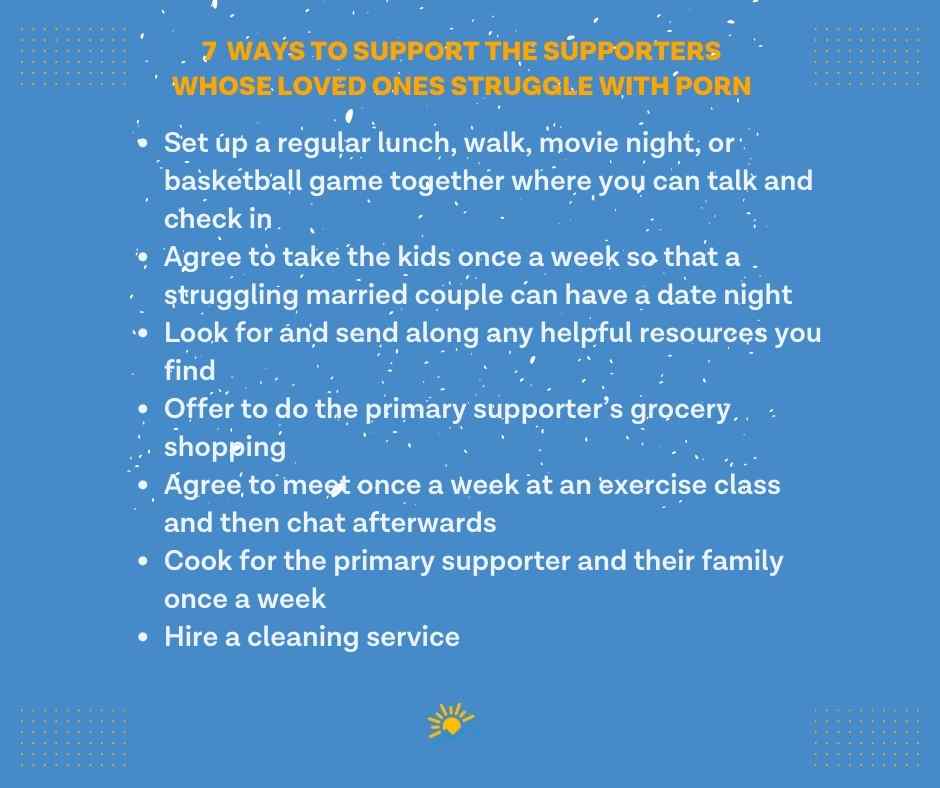In the business of supporting those who are struggling with porn, we often give a lot of attention to two groups. Obviously, we spend a lot of time trying to help the individuals with compulsive or problematic porn habits.
We also try as much as possible to support the spouses, parents, and close friends of those struggling with pornography. We call these people supporters, and they are often desperate for resources.
Supporters, whose loved ones struggle with porn, are at ground zero in the battle with pornography habits or addictions. Sometimes this feels like a challenging trial with no clear end in sight.
Fighting porn effectively requires support
There is an often-overlooked element of this supportive role. Many of these supporters are dealing with a lot of anxiety and stress themselves. This is for good reason!
Primary supporters: the challenges of having loved ones who struggle with porn
These individuals are often struggling just as much as the person who is viewing porn. Spouses can feel a sense of betrayal and a loss of trust when they discover their spouse has been regularly viewing pornography.
Parents are often terrified to learn that their teens or younger children have been exposed to or sought out pornography. Telling someone else about this feels very difficult. So this brings up the question, who is supporting the supporters? The answer is simple: we all should be.
Defining the role of secondary supporters
Each of us should be encouraging and helpful not only those struggling with pornography but also those who are their primary support team. The secondary support system is the friends, uncles, grandparents, siblings, and others who are vital to a healthy recovery process. They are the safety net of the whole process. These supporters are critical to ensuring that both the person trying to overcome pornography and the people whose loved ones struggle with porn day in and day out do not get burned out or overwhelmed.
As a secondary supporter, sometimes it can be difficult to know exactly what you’re supposed to do. You may feel too removed from the situation to offer much tangible help. Just bringing up the topic may feel awkward to you.
You may be aware of the issue, but unsure if it’s appropriate to bring up in conversation (even if this awareness came from secondary channels and not directly from the person dealing with pornography).
You likely feel stuck, wanting to help and support someone whose loved one struggles with porn – but uncertain how you can. That’s where we come in! This guide will help you become the best secondary supporter you can be by guiding you through the three phases of providing critical secondary support to your family and friends.

Providing secondary support – 3 important phases
To help you get the most out of this guide, keep the following two terms in mind. We’re assuming that you have someone in your life that you know that is struggling with pornography, but you are not their main supporter. This is often a spouse, parent, or maybe a best friend. We will call these individuals the primary supporters (whose loved ones struggle with porn). You are the secondary supporter, the family member or friend who is wanting to make a difference by supporting the primary supporter.
Phase 1: Establish Open Lines of Communication

The first thing to do is to establish clear and open lines of communication with the primary supporter you know.
So how do you start a conversation with a primary supporter about their loved one struggling with porn? There is plenty of social stigma about pornography that understandably makes this an awkward conversation to approach.
You don’t want them to assume you’re judging the person they’re supporting or even judging them for wanting to be a primary support. Either of these perceptions will keep them from being able to fully relax and trust you. That is why we want to encourage you to be proactive in reaching out to them, while remaining non-judgmental.
Approach the conversation in the right setting, too, remembering that it is a touchy subject. We recommend you have this conversation in person, in a place where you won’t be overheard (not over text).
Here are some examples of ways to start the conversation:
“There’s something I’ve been meaning to bring up. I don’t want to pry or make things awkward, but I want to let you know I’m thinking about you . You mentioned that [s/he] is struggling with porn, and I want you to know that I feel for you, and I want to be here for you…”
“Hey, I have noticed that you’ve been a little more distant and stressed lately. I know you’re working through some difficult issues. Does it have anything to do with [his/her] porn use? Don’t worry, I’m not here to judge. I just want to help out in any way I can. I know what you’re going through can be pretty hard.”
“This may not be my business, and I’m sorry if I’m overstepping, but I know you’re facing challenges… You know I love [him/her], but if it were me in your shoes, I would be struggling, too. I just want you to know that I’m here for you, if you’d like someone to talk to about it, and if there is anything I can do.”
Once you’ve had this first conversation and expressed your desire to help, it’s time to listen. Don’t assume that you know the best way to help. Focus on what the primary supporter says they need, even if you disagree or think they need something else.
People only use resources they think are helpful to them. Even if you feel you could be helpful in another way, if the primary supporter doesn’t want the offered help, don’t push it.
It’s one thing to offer to listen and support, but another thing entirely to put that into practice. Try to come up with some offers of help that will be tangible and most importantly, consistent. Based on the person’s need, help can look many ways.
Here are just a few practical ways to support those whose loved ones are struggling with porn:
- Setting up a regular lunch, walk, movie night or basketball game together where you can talk and check in about how things are going.
- Agreeing to take the kids once a week so that a struggling married couple can have a date night, or while the primary supporter goes to a therapy appointment.
- Looking for and sending along any helpful resources you find.
- Offering to do the primary supporter’s grocery shopping while you do yours and dropping it off on your way home.
- Agreeing to meet once a week at an exercise class and then chatting afterwards (Maybe you can find a class during a time that works best for them so they don’t have to).
- Cooking for the primary supporter and their family once a week.
- Hiring a cleaning service (if you have extra funds) to go in and take care of bathrooms and floors would be a huge weight off an overwhelmed parent.
- Finding and setting up an initial therapy appointment for the primary supporter and/or the person they are supporting. Often, this can be a daunting task that takes a lot of focus and motivation, which could be difficult for someone who’s already stressed out.

Phase 2: Establish a Personal Routine
Being a step removed from this process as a secondary supporter can make you feel disconnected from the day-to-day process of overcoming pornography. Because of this, a common issue for secondary supporters is that they become disengaged over time.
They have the best intentions at first.
Over time, due to a lack of communication and a lack of regular interaction with the person struggling with pornography they eventually lose their drive or ability to help. It is important to get into a personal routine when it comes to your secondary supporter role.
To do this, you will need to set yourself up to not forget about it. Whatever your method is for remembering important events and appointments, schedule check-ins to your system. Whether this is weekly reminders on your devices, written or entered into a calendar or planner, or scribbled on your bathroom mirror, make sure you won’t be able to forget the person you are supporting.
You may even need to take it a step further by setting up a system to help remember why you are doing this. Remember: the primary supporter is in this for the long haul. Pornography problems do not disappear overnight, so they will need support for probably longer than you realize.
Consider setting up an additional “firewall,” so to speak, that will pop up with your weekly reminder, something you can commit to reading each time before you decide whether to help. This could be a mantra, lyric, or Bible verse that reminds you of the importance of generosity towards a struggling friend.
Or you could include a phrase or statistic that reminds you of how legitimately difficult it is to overcome porn. “Why you should care about pornography.”
Perhaps create reminders of how long the recovery road could be. What would help motivate you if you start to lose focus? Remember, though you are just one person, to one person you can mean the world. Your support makes a difference!

Phase 3: Reevaluate regularly
Once you’ve opened lines of communication and gotten into a regular routine in terms of your helping responsibilities, the final phase is to regularly reevaluate your supportive role. This always involves two parts. The first is to reevaluate your helping role with the primary supporter. Their needs are likely to shift and change over time, so it’s critical that you change what you are doing in response to their changing needs.
We suggest checking in about once a month specifically about their needs and how you can best support them. As you have committed, make sure that you’re helping the most useful ways possible. Depending on your relationship with the primary supporter, you could simply ask directly if what you’re doing is providing relief. Also ask if there is something else you could do that would help even more.
However, some people don’t want to feel like a burden and may be grateful for whatever they can get, so you might need to ease into the conversation. Ask them if anything has changed. Have they noticed any improvements or changes for the worse? As you’re listening, take note of areas that seem easier or more stressful for them. Then offer to change what you’re doing to help in a highly stressful area for a while.
The second part of the reevaluation process is to consider how much you have been able to engage in the support process. We all have great intentions to do a lot of things that never come to fruition and being a strong secondary supporter can be the same way.
As you go through the reevaluation process, consider these questions:
- Have you actively done anything to support the primary supporter since you put your plan into action?
- Do you feel like your efforts are making a difference? If not, why do you think that is the case?
- Have things gotten in the way of you implementing your support plan? If so, what are they?
As you consider these questions, you should think about if there are small but important shifts or changes that are needed in your support plan.
For example, you might realize that what you initially committed to is too much for you to keep up on. When this happens, it’s tempting to drift out of contact, but the primary supporter is still struggling.
Creating a longer-term, realistic support plan
It’s much better to reassess your capacity to help and try to figure out:
- Is there something different you can regularly commit to that you do have the capacity for? If so, communicate why and in what ways your support needs to change.
- Are you truly unable to support them anymore? If this is the case, be honest. If possible, do your best to help them make a plan to address that area of need and find other resources, especially if they have come to rely on you in any way.
It’s possible that your role as a secondary support is placing undue stress on someone in your life. If that’s the case, make sure that the people who care about you are on board with you helping the primary supporter. If needed, shift your support so that it is no longer impacting other relationships.
Also, if you started out paying for a service for the primary supporter, it is very likely that it was only meant to be temporary. You should not continue doing so unless it continues to work well for you and your family. Keep an open line of communication with the primary supporter. Let them know if any changes need to be made based on your needs, too.
Engaging in this three-phase support process will help you become the most helpful secondary supporter possible. The more resources we provide to people struggling with pornography, the more likely they will be able to put their pornography use behind them.
Primary supporters are going through an exhausting and often painful experience, especially if they are in an intimate relationship with the person struggling with pornography. They may not always be able to admit it, but they need help. If you are in any position to help them, then they need you.
If you want to learn more about the dangers of pornography and why it’s so hard to quit, we recommend reading through our blog or more of our resources[AP1] , including this one about what it’s like to be an accountability partner (primary supporter) for a spouse.
Keep learning, because anything you learn will help you in this role as a secondary support. Also, give yourself a huge pat on the back if you have decided to step in as secondary support. Being a secondary support person is generous, potentially challenging, and even highly rewarding. Remember to take care of yourself and keep checking in, both with the primary support and with yourself along the way.
14-Day Free Trial
Protection From Pornography
Change your habits, change your life: Start our 14-day free trial to help get rid of pornography for good.


